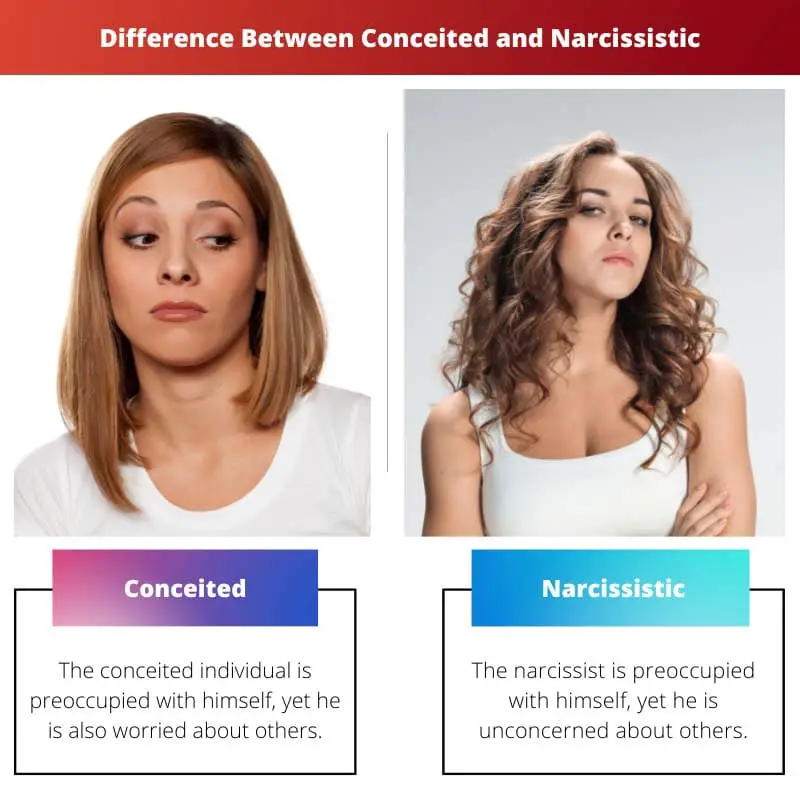While conceited and narcissistic are used interchangeably, they don’t mean the same thing. Conceited is a synonym for vain, which means “excessively proud of one’s appearance or achievements.”
Narcissism describes overly self-involved and proud and vain, but it also suggests that a person has a fragile ego that’s easily bruised. A conceited person may ignore others’ opinions; a selfish person can’t stop thinking about them.
Key Takeaways
- Conceited individuals have an inflated sense of self-worth. They are preoccupied with their abilities or appearance, while narcissistic individuals have a more pervasive pattern of grandiosity, need for admiration, and lack of empathy.
- Narcissism is a personality disorder (Narcissistic Personality Disorder) with more severe and long-lasting effects on relationships and functioning. At the same time, the conceit is a less extreme trait that may not have the same level of impact on one’s life.
- Both conceited and narcissistic individuals may struggle with interpersonal relationships, but narcissistic individuals exhibit more manipulative and exploitative behaviors.
Conceited vs Narcissistic
Conceited and narcissistic individuals exhibit excessive self-love, but with differing degrees and manifestations. Conceited people possess an inflated self-image and may appear boastful or pretentious. Narcissistic individuals have a more deeply ingrained and pervasive personality disorder, marked by a lack of empathy and manipulative behavior.

Conceited people are arrogant and self-centered. They believe that they are better than everyone else and have nothing to learn from other people.
They will act as though they are superior to others, making it hard for them to have meaningful relationships with other people.
Narcissistic personality disorder (NPD) is a mental disorder characterized by an established pattern of being fixated on oneself, permeating the sufferer’s thoughts, feelings, and actions and their relationships with other people.
This pattern is manifested in various contexts, such as interpersonal or occupational. This fixation is also accompanied by an inability to recognize the feelings and needs of others.
Comparison Table
| Parameters of Comparison | Conceited | Narcissistic |
|---|---|---|
| Concern for the welfare of others | The conceited individual is preoccupied with himself, yet he is also worried about others. | The narcissist is preoccupied with himself, yet he is unconcerned about others. |
| Interrelationship | Interrelationship conceit is a narcissistic trait. | It is possible to be self-centered without being narcissistic. |
| Origin | The term conceited was first used around 1600. Self-conceited is abbreviated to conceited. | The name “narcissism” comes from the Greek legend of Narcissus, although it wasn’t created until the late 1800s. |
| Antonyms | Shy and timid are antonyms of Conceited. | Narcissism has the antonyms modest and self-effacing. |
| Attention | A conceited individual could share their attention with those around them. | A narcissist doesn’t appear to ‘share’ anything with anyone other than ‘negative’ attention. |
What is Conceited?
Conceited people love to talk about themselves. They like to speak, and they want to be heard. They may do all the talking in a conversation and then expect you to be impressed by their stories.
Conceited people may also focus primarily on their own opinions rather than consider others’.
Conceited people think highly of themselves. They believe that they are talented and capable, and they act in a way that shows off their supposed talents or uniqueness.
For example, a conceited person might buy an expensive car to show off his wealth or wear extravagant clothing because he believes he looks good in them.
Conceited people are also known as narcissists. Narcissism is a psychiatric illness characterized by an exaggerated feeling of self-importance, an obsession with oneself, and a lack of empathy for others.
There are subtle signs that someone is conceited, but other indicators aren’t easy to hide. In most cases, conceited people don’t think there’s anything wrong with their behavior or personality, so it would never occur to them to try to appear more humble or empathetic. You might have to point it out before they’ll change their ways.
A conceited person’s self-esteem is inflated, and he thinks of himself as wonderfully amusing and amazing. He tends to be overly demanding of attention and boast about his talents or achievements at every opportunity available.
An exaggerated sense of self-worth characterizes conceit, and the conceited individual will display his ego in a show.

What is Narcissistic?
Being incredibly self-involved, vain, boastful, and egotistical are associated with narcissism. The term originated from Greek mythology, where Narcissus was a hunter who fell in love with his reflection in the water.
A narcissistic personality disorder is defined as an inflated sense of self-importance, a lack of empathy for others, and a great need for admiration.
The cause of narcissistic personality disorder is unknown. However, it’s believed to be rooted in childhood abuse or neglect or parents’ excessive pampering of a child.
Many people exhibit some narcissistic traits, but full-blown narcissistic personality disorder afflicts only about 1% of the population. Men are more likely than women to be diagnosed with this condition.
People with the disorder may come across as conceited, boastful, or pretentious. They monopolize conversations and belittle or look down on people they perceive as inferior.
They may also feel a sense of entitlement — and when they don’t receive special treatment, they may become impatient or angry.
Although some features of narcissistic personality disorder may seem like having confidence or strong self-esteem, it’s not the same. Narcissistic personality disorder crosses the border of healthy faith into thinking so highly of themselves.

Main Differences Between Conceited and Narcissistic
- While arrogant people may brag about themselves, they seldom dismiss or devalue their partners or friends. On the other hand, a narcissist will boast about themselves while denigrating or demeaning their wives and ‘friends.
- Around 1600, the word “conceited” was coined. The term “narcissism” was coined in the late 1800s.
- Conceited has the synonyms assured and egoistic, while narcissistic is self-obsessed and vain.
- Although a person might be conceited without being narcissistic, but conceit is a narcissistic trait.
- Conceited has antonyms such as shy and timid, whereas Narcissistic has antonyms such as modest and self-effacing.

- https://psycnet.apa.org/record/1992-03870-001
- https://www.tandfonline.com/doi/abs/10.1080/15298868.2012.659427
